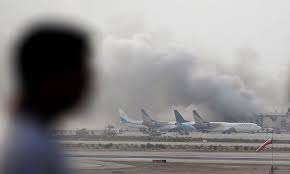
Karachi, Pakistan (CNN) — Terrorists entered Karachi’s Jinnah International Airport at two different spots with a big plan: to destroy a group of parked airplanes and “bring down our aviation industry,” according to the Pakistani government.
It was late Sunday night, and the militants were armed with guns, grenades and suicide vests. They went into the cargo area, about a kilometer (0.62 miles) from where commercial planes take off.
In a “heroic” effort, security forces “laid down their lives” to block the terminal and stop the attackers, surrounding them and killing all of them, the prime minister’s office said in a statement.
There were 10 terrorists, military spokesman Maj. Gen. Asim Bajwa said, and two of them detonated suicide vests.
By the time the attack was over, 28 people were dead, including eight members of airport security forces, two Pakistan International Airlines employees and one ranger. Another 24 people were injured, the military said.
The Pakistani Taliban claimed responsibility for the assault on the country’s largest and busiest airport.
Speaking from an undisclosed location, Pakistani Taliban commander Abdullah Bahar said the attack was retaliation for the death of former chief Hakimullah Mehsud, who was killed in a U.S. drone strike in November in North Waziristan.
Bahar warned more attacks will follow.
“As long as we are breathing, our attacks will be continuing ’til the end of our lives,” he vowed.
Fire followed attack
A building caught fire in the attack, but no planes were damaged, Bajwa said. The airport reopened Monday.
Some Pakistani media reported a renewed gun battle at the airport later Monday morning. But officials told CNN the noise was from fire-heated chemical containers exploding.
Still, as a precaution, security forces opened fire, said Ahmad Chinoy of the Citizen’s Police Liaison Committee. He said he was 100% sure there were no militants left in the airport.
Several days ago, Pakistan’s government had warned provincial officials of a possible “high-profile attack on a sensitive or key installation,” said Qaim Ali Shah, chief minister of Sindh province. But the warning, he said, did not mention the airport.
‘We felt like sitting ducks’
Farooq Sattar, a member of parliament, was on a plane at the airport when the attack took place.
“My aircraft was on the tarmac ready to take off when suddenly, from what I understand, a message came to the pilot saying to get off the runway and return to the gate,” Sattar told CNN. “I heard shots and saw smoke.”
“Before the pilot could announce anything, I had text messages blowing up my phone saying ‘Karachi airport under attack.’ We were in the aircraft for three hours, full of fuel. They locked the doors.
“The airport was poorly guarded. It was only due to some airport security personnel that the attack got thwarted and the militants didn’t make it to our part of the airport. Passengers were extremely nervous. They started looking at me for answers.”
“We felt like sitting ducks on the tarmac,” he added.
Two crew members who were on their first ever flight “freaked out,” Sattar said.
History of terror
The Pakistani Taliban, which is formally known as Tehreek-i-Taliban Pakistan (TTP), has long conducted an insurgency against the Pakistani government.
“Their primary target is the Pakistani state and its military,” said Raza Rumi of the Jinnah Institute, a Pakistani think tank.
“It resents the fact that (Pakistan) has an alliance with the West, and it wants Sharia to be imposed in Pakistan.”
The group claimed responsibility for a December 2009 suicide bombing at the United States’ Forward Operating Base Chapman in Khost, Afghanistan.
The attack killed seven U.S. citizens, including five CIA officers and a member of Jordanian intelligence.
The U.S. Justice Department charged Mehsud in 2010 for his alleged involvement in the attack.
Mehsud took over from Baitullah Mehsud, a fellow clan member, in 2009 after the latter was killed in a U.S. drone strike. Four years later, Hakimullah Mehsud suffered the same fate.
More claims and threats
Another TTP member claimed that the Pakistani government has been “abducting and killing innocent people,” and explained why the airport was targeted.
“We chose a location where there would be less civilian and more official casualties,” TTP representative Shahidullah Shahid said.
Shahid warned the group will engage “in a full-out war with the Pakistani state, starting on June 10.”
But “if even now the Pakistani government backs down,” Shahid said, “we are ready to engage in meaningful dialogue.”
Karachi airport attackers were disguised as security workers
More violence
The airport wasn’t the only site of violence in Pakistan on Sunday.
Twin suicide attacks near the border with Iran left 24 people dead, including four terrorists, authorities said. Qambar Dashti, commissioner of the Quetta Division, told CNN two suicide bombers blew themselves up in a hotel where dozens of Shia pilgrims from Iran were staying.
Dashti said 14 out of 18 wounded pilgrims were in critical condition.
Extremist Sunni militant group Jaish el-Islam, a splinter group of Lashkar e Jhangvi, claimed responsibility.
On Monday, while Karachi operated as usual, there was violence in other parts of the country.
Three soldiers were killed and many others were wounded in a suspected suicide attack at a checkpoint in North Waziristan, military officials said.
